
Rewired: Research-Writing Partnerships within the Frameworks — eEditions PDF e-book
The download link for this product can be found on the final confirmation screen after you complete your purchase, and may also be accessed from your Account Profile. For more information about ALA eEditions file types and how to view them on eReaders, desktop computers, and other devices, see this page.
Primary tabs
You don't need to be an ALA Member to purchase from the ALA Store, but you'll be asked to create an online account/profile during checkout to proceed. This Web Account is for both Members and non-Members. Note that your ALA Member discount will be applied at the final step of the checkout process.
If you are Tax-Exempt, please verify that your account is currently set up as exempt before placing your order, as our new fulfillment center will need current documentation. Learn how to verify here.
- Description
- Table of Contents
- About the author
Colleges and universities tend to be siloed spaces where we work within our own departments, divisions, and units and don’t always recognize the connections we have with the work of our colleagues down the hall. Rewired: Research-Writing Partnerships within the Frameworks highlights the clear connections between two important disciplinary documents—the Framework for Success in Postsecondary Writing (CWPA, NCTE, and NWP, 2011) and the Framework for Information Literacy for Higher Education (ACRL, 2016)—and examines partnerships between librarians and their colleagues who are teaching information literacy in new and impactful ways.
Researching and writing are inseparable and interdependent processes, even in activities without a required research/source use component. From disciplines and areas one would expect—English departments, first-year writing programs, and university writing centers—to those perhaps more unexpected, such as the health sciences, courses in music, and summer bridge programs, Rewired features partnerships within a range of institutional types that have built upon the connections between these Frameworks in ways that construct meaningful relationships for students as they develop expertise in research-writing.
The chapters in Section 1, Developing a Shared Understanding, show off the ways we can learn from each other’s expertise when we engage in conversation and break down the disciplinary silos that tend to separate us. The range of curricular reforms at institutions across the country showcased in Section 2, Partnering Research & Writing, offer multiple options for how partnerships between faculty members invested in writing in the disciplines and their librarian colleagues might develop in different kinds of institutional contexts. And finally, Section 3, Assessing Writing & Information Literacy, challenges us to think about how we assess students’ research-writing development and the impact of the partnerships we develop.
College and research librarians have of course been working alongside professors invested in writing in the disciplines for decades. What is new about these partnerships is how faculty members and librarians are re-imagining their work, rewiring it if you will, for students in a world where writing is both global and largely digital.
Foreword
Sharon Mader
Acknowledgments
Introduction. Partnerships Rewired for the Digital Age
Randall McClure
SECTION 1: Developing a Shared Understanding
Chapter 1. The Art of Conversation: Dialog between a Librarian and a Writing Program Administrator
Brenda Refaei and M. Lauren Wahman
Chapter 2. Interpreting the Frameworks: Faculty Constructions of Research and the Researching Student
Rick Fisher and Kaijsa Calkins
Chapter 3. Giving Voice to Students: A Rhetorical Analysis of the Frameworks
Rosalind Bucy, Gillian Devereux, Maric Kramer, and Jenne Powers
Chapter 4. In a Research-Writing Frame of Mind
Kathy Christie Anders and Cassie Hemstrom
SECTION 2: Partnering Research and Writing
Chapter 5. Bridging the Gap: New Thresholds and Opportunities for Collaboration
Amber Lancaster, Donell Callender, and Laura Heinz
Chapter 6. Integrating the Frameworks in Postsecondary Writing: Disciplinary Literacy in First-Year Composition
Nancy C. DeJoy, Sara D. Miller, and Brian D. Holcomb
Chapter 7. Researching and Writing as Braided Processes: A Co-Curricular Model
Stacy Kastner and Hillary Richardson
Chapter 8. Partnership as Process: Moving Toward an Integrated Undergraduate Writing Curriculum
Elizabeth L. Wallis, Jim Nugent, and Lori Ostergaard
Chapter 9. Metaliteracy in the Digital Landscape: Using Wikipedia for Research-Writing Across the Curriculum
Theresa Burress, Maribeth Clark, Sarah Hernandez, and Nova Myhill
Chapter 10. Teaching the Frameworks for Writing and Information Literacy: A Case Study from the Health Sciences
Teresa Quezada
Chapter 11. Dynamic Duos: Blended Instruction and Faculty-Librarian Collaboration
Kathleen Reed and Dawn Thompson
SECTION 3: Assessing Writing and Information Literacy
Chapter 12. The Frameworks, Comparative Analyses, and Sharing Responsibility for Learning and Assessment
Teresa Grettano and Donna Witek
Chapter 13. Leveraging New Frameworks to Teach Information Appropriation
William Duffy, Rachel E. Scott, and Jennifer Schnabel
Chapter 14. Can We Talk Multimodality?
Meghan Roe and Julius Fleschner
Afterword. Building Meaningful, Institution-Specific Partnerships
Susan K. Miller-Cochran
About the Contributors
Randall McClure
Randall McClure has taught writing at several universities, including Miami University, Georgia Southern University, Cleveland State University, and Minnesota State University, Mankato. He researches in the areas of information behavior and academic writing, teaching and learning online, and academic policy. He has published articles recently in The Writing Instructor, Inside Higher Ed, portal: Libraries and the Academy, Computers and Composition Online, Academic Exchange Quarterly, Computers and Composition, Writing Spaces, WPA: Writing Program Administration, Writing and Pedagogy, and the Journal of Literacy and Technology. He is co-editor with James P. Purdy of The New Digital Scholar: Exploring and Enriching the Research and Writing Practices of NextGen Students and The Next Digital Scholar: A Fresh Approach to the Common Core State Standards in Research and Writing.


